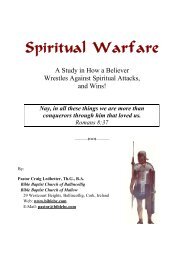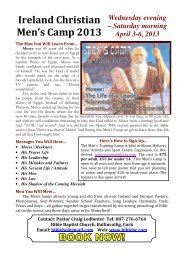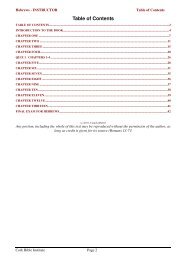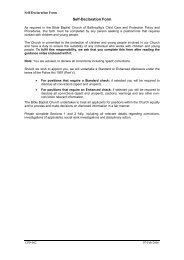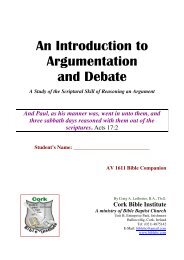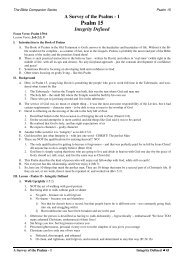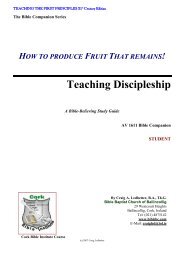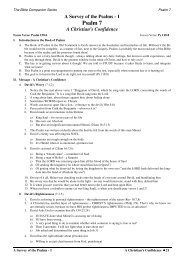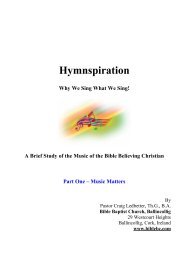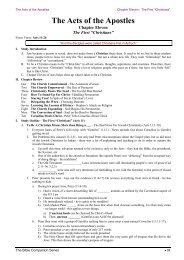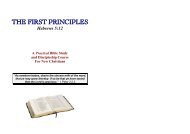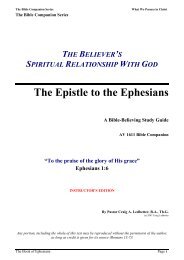THE DOCTRINE OF SALVATION - Student.pdf - Bible Baptist ...
THE DOCTRINE OF SALVATION - Student.pdf - Bible Baptist ...
THE DOCTRINE OF SALVATION - Student.pdf - Bible Baptist ...
Create successful ePaper yourself
Turn your PDF publications into a flip-book with our unique Google optimized e-Paper software.
Soteriology<br />
The Vocabulary Of Salvation.<br />
b. . He was justified apart from the Levitical offerings (Ps. 32:1, 2; 51:16, 17; Rom. 4:6-<br />
8).<br />
5. The results of justification.<br />
a. The of sin’s penalty (Acts 13:38, 39; Rom. 4:7; 6:23; 8:1, 33, 34; 2 Cor. 5:21;<br />
Eph. 1:7; 4:32; Col. 2:13).<br />
b. The to divine favor (Rom. 5:1-11).<br />
c. The of Christ’s righteousness (Mt. 22:11; Lk. 15:22-24; Rom. 4:11; 1 Cor.<br />
1:30; 2 Cor. 5:21).<br />
6. In conclusion, man justifies only the innocent, but God only the guilty. Man justifies on the<br />
basis of self-merit, but God on the basis of the Saviour’s merit.<br />
R. Sanctification.<br />
“And for their sakes I sanctify myself, that they also might be sanctified through the truth” (Jn.<br />
17:19).<br />
“Husbands, love your wives, even as Christ also loved the church, and gave himself for it; that<br />
he might and cleanse it” (Eph. 5:25, 26).<br />
“For this is the will of God, even your sanctification” (1 Thess. 4:3).<br />
“And the very God of peace sanctify you wholly” (1 Thess. 5:23).<br />
1. Sanctification defined.<br />
a. Sanctification Means “ ”<br />
b. Negative considerations (what it is not):<br />
1) It is not the (complete removal) of the sinful nature. In fact, those who<br />
boast of the eradication of their sinful natures actually claim that which Paul, James, and<br />
John admit they had not attained.<br />
a) “Not as though I had already attained, either were already perfect: but I follow after, if<br />
that I may apprehend that for which also I am apprehended of Christ Jesus” (Phil. 3:12-<br />
14; cf. Jas. 3:2; 1 Jn. 1:8, 9; 2:1).<br />
b) Note: The opposite (and equally erroneous) position of eradicationism is antinomianism,<br />
which means literally “against the law.” This was the theory that a Christian was under<br />
no moral obligation whatsoever to observe the commandments. Thus, the first view was<br />
an attempt to eliminate sin, while the second simply enjoyed it.<br />
c) Both sinless perfection and sinful imperfections are unscriptural doctrines. Although the<br />
Christian cannot be sinless, he can, nevertheless, through sanctification, sin less.<br />
2) It is not the “second blessing.” In 2 Corinthians 1:15 Paul writes: “And in this confidence I<br />
was minded to come unto you before, that ye might have a second benefit.” Some have taken<br />
their theology of the second blessing from this verse. However, Paul describes the Corinthian<br />
believers in his first epistle as already being sanctified (1:2; 6:11).<br />
3) It is not the . In 1 Corinthians 12:13 Paul<br />
says all believers have been baptized by the Holy Spirit, regardless of their personal spiritual<br />
condition. Compare this with 1 Corinthians 3:1-4.<br />
c. Positive considerations (what it is):<br />
1) Sanctification occurs in various forms some 300 times in the New Testament and 760 times<br />
in the Old Testament for a total of 1060 in the <strong>Bible</strong>. The basic meaning in all these instances<br />
is “<br />
.” Thus:<br />
a) Days and seasons were sanctified (Gen. 2:3; Deut. 5:12; Neh. 13:19-22; Joel 1:14; 2:15).<br />
b) Physical objects were sanctified. These included:<br />
Cork <strong>Bible</strong> Institute Page 23



